As the 2019 nears its end and the festive season is on, SAFETY4SEA has made a list of the best books its editors read throughout the year, addressed to anyone forming part of the maritime industry or not, and with themes varying from shipping disasters to the hot topic of safety and human error. So, grab a book and let the Christmas holiday begin!
- Year in review: How the maritime security landscape evolved in 2019
- Ten shipping books we read in 2019
- Year in Review: Timeline of smart shipping developments in 2019
- Year in Review: Top shipping stories to remember from 2019
- Year in Review: Shipping’s 2019 highlights
- Year in Review: Environmental issues that caught shipping’s eye in 2019
#1 Too Big to Ignore: The Business Case for Big Data
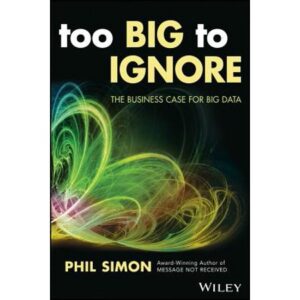 The award-winning author Phil Simon wrote a thought-provoking book, entitled ‘Too Big to Ignore: The Business Case for Big Data’, seeking to dispel the mysticism surrounding the technology trend of Big Data for organizations. ‘Too Big to ignore’ comes to explain with tangible examples why Big Data can form a game changer for many companies in the near future, paving the way for growth opportunities. Drawing an interesting mix of real-life examples and case studies from global innovators in the field, ‘Too Big to Ignore’ becomes a must-read for the whole range of business professionals, CEOs, owners, and many more.
The award-winning author Phil Simon wrote a thought-provoking book, entitled ‘Too Big to Ignore: The Business Case for Big Data’, seeking to dispel the mysticism surrounding the technology trend of Big Data for organizations. ‘Too Big to ignore’ comes to explain with tangible examples why Big Data can form a game changer for many companies in the near future, paving the way for growth opportunities. Drawing an interesting mix of real-life examples and case studies from global innovators in the field, ‘Too Big to Ignore’ becomes a must-read for the whole range of business professionals, CEOs, owners, and many more.
#2 The Captains of Thor: What Really Caused the Loss of the SS El Faro in Hurricane Joaquin
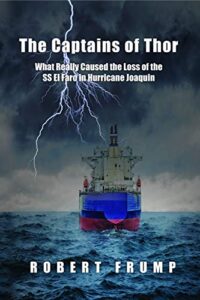 The El Faro sinking has been marked in people’s minds as one of the worst maritime disasters in US recent history. Seeking to expand the current context of a formal investigation to a non-fiction narrative, the book, written by Robert R. Frump, an American well-recognized journalist, comes to put a new cornerstone in this multi-discussed case. By providing a backstage illustration of how the emotions and moods of crews onboard form the general vibe of shipping in the modern era and sharing an image of the unwritten pressures that ship Captains have to encounter, the book ends up as a thought-provoking look into the safety culture and system today’s merchant marine.
The El Faro sinking has been marked in people’s minds as one of the worst maritime disasters in US recent history. Seeking to expand the current context of a formal investigation to a non-fiction narrative, the book, written by Robert R. Frump, an American well-recognized journalist, comes to put a new cornerstone in this multi-discussed case. By providing a backstage illustration of how the emotions and moods of crews onboard form the general vibe of shipping in the modern era and sharing an image of the unwritten pressures that ship Captains have to encounter, the book ends up as a thought-provoking look into the safety culture and system today’s merchant marine.
#3 Seized: A Sea Captain’s Adventures Battling Scoundrels and Pirates While Recovering Stolen Ships in the World’s Most Troubled Waters
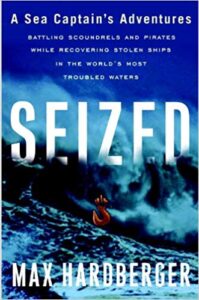 Written by Max Hardberger, a ship captain, airplane pilot, lawyer, teacher and writer, provides readers with exactly what it promises: An exciting story of a Captain who recovers stolen freighters for a living. Desperate owners hire Hardberger along with his ‘mission-impossible team’, to retrieve illegitimately seized ships in many areas of the world, from Greece to Venezuela and from Haiti to Russia, under cover of darkness. If the crew gets caught, they die or get imprisoned: Even the slightest noise, and much more the noise of a ship’s diesel engine, can prove fatal. This book has nothing to do with a normal Merchant Marine story.
Written by Max Hardberger, a ship captain, airplane pilot, lawyer, teacher and writer, provides readers with exactly what it promises: An exciting story of a Captain who recovers stolen freighters for a living. Desperate owners hire Hardberger along with his ‘mission-impossible team’, to retrieve illegitimately seized ships in many areas of the world, from Greece to Venezuela and from Haiti to Russia, under cover of darkness. If the crew gets caught, they die or get imprisoned: Even the slightest noise, and much more the noise of a ship’s diesel engine, can prove fatal. This book has nothing to do with a normal Merchant Marine story.
#4 The Box: How the Shipping Container Made the World Smaller and the World Economy Bigger
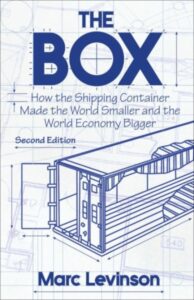 Almost every good we owe has probably traveled for weeks on a ship before it came to our hands. But have you ever wondered how shipping came to be what it means for today? Marc Levinson, an economist, historian, and journalist, attempted to provide an answer, creating the very first comprehensive history of the shipping container. “The Box” goes behind the scenes of the container’s creation, sharing the difficulties prior to its wide adoption. In a story equally measured on information and entertainment, the author comes to remind that containerization, as a very significant component of the modern economy, did not just happen but had to deal with problems, and that without container, there would be no globalization.
Almost every good we owe has probably traveled for weeks on a ship before it came to our hands. But have you ever wondered how shipping came to be what it means for today? Marc Levinson, an economist, historian, and journalist, attempted to provide an answer, creating the very first comprehensive history of the shipping container. “The Box” goes behind the scenes of the container’s creation, sharing the difficulties prior to its wide adoption. In a story equally measured on information and entertainment, the author comes to remind that containerization, as a very significant component of the modern economy, did not just happen but had to deal with problems, and that without container, there would be no globalization.
#5 Into the Raging Sea: Thirty-three mariners, one megastorm and the sinking of El Faro
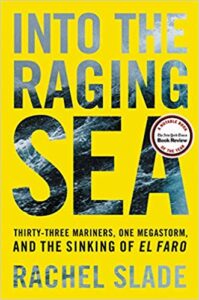 As another account on the most ‘popular’ maritime accident in the US, the book attempts to unfold the El Faro mystery. As a result from extensive investigation and personal interviews with industry experts and relatives of the victims, Rachel Slade, an investigative journalist with a special interest on maritime safety, wrote a book that takes the reader in the final 24 hours onboard. Unveiling what went wrong in El Faro, the book ends up not only as a dramatic minute-by-minute account of a poor safety culture, but much more a cautionary tale for shipping which is struggling to minimize human error-related disasters.
As another account on the most ‘popular’ maritime accident in the US, the book attempts to unfold the El Faro mystery. As a result from extensive investigation and personal interviews with industry experts and relatives of the victims, Rachel Slade, an investigative journalist with a special interest on maritime safety, wrote a book that takes the reader in the final 24 hours onboard. Unveiling what went wrong in El Faro, the book ends up not only as a dramatic minute-by-minute account of a poor safety culture, but much more a cautionary tale for shipping which is struggling to minimize human error-related disasters.
#6 An Empirical Study of Behavioral Pattern of Seafarers: An Indian Exploration
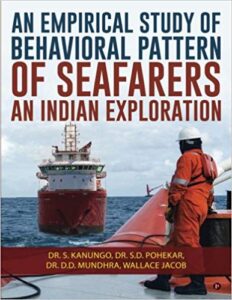 Presenting the results of a comprehensive survey to examine all the current challenges faced by seafarers, the book attempts to build the picture of seafarers’ life and thinking patterns, in a bid to comprehend these challenges and to understand how they are affecting this very special professional category. Combining knowledge of four academics with experience in the maritime industry, the book touches on various topics, ranging from autonomous ships to issues associated with drug trafficking and, from the Belt and Road Initiative to the very current issue of cybercrime, piracy and cargo fraud.
Presenting the results of a comprehensive survey to examine all the current challenges faced by seafarers, the book attempts to build the picture of seafarers’ life and thinking patterns, in a bid to comprehend these challenges and to understand how they are affecting this very special professional category. Combining knowledge of four academics with experience in the maritime industry, the book touches on various topics, ranging from autonomous ships to issues associated with drug trafficking and, from the Belt and Road Initiative to the very current issue of cybercrime, piracy and cargo fraud.
#7 Sustainable Shipping: A Cross-Disciplinary View
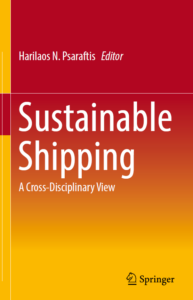 A new academic book, entitled ‘Sustainable Shipping: A cross-disciplinary view’, analyzes the key trends shaping the sustainability agenda in maritime transport, attempting to review models that can be used to evaluate the various regulatory decisions, policy alternatives and tradeoffs, as we move toward 2050. Written by Dr. Harilaos N. Psaraftis, Professor at the Technical University of Denmark, the book comes to provide the reader with a compilation of material on sustainable shipping, analyzing the term of sustainability from an economic, environmental and social point of view. Leveraging the scientific contribution and knowledge of 23 co-authors, the book ends up underlining that achieving “win-win” solutions is a prerequisite for a true sustainable shipping.
A new academic book, entitled ‘Sustainable Shipping: A cross-disciplinary view’, analyzes the key trends shaping the sustainability agenda in maritime transport, attempting to review models that can be used to evaluate the various regulatory decisions, policy alternatives and tradeoffs, as we move toward 2050. Written by Dr. Harilaos N. Psaraftis, Professor at the Technical University of Denmark, the book comes to provide the reader with a compilation of material on sustainable shipping, analyzing the term of sustainability from an economic, environmental and social point of view. Leveraging the scientific contribution and knowledge of 23 co-authors, the book ends up underlining that achieving “win-win” solutions is a prerequisite for a true sustainable shipping.
#8 Being Human in Safety-Critical Organizations
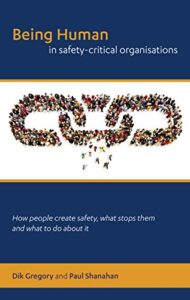 Have you ever wondered about the complex procedures surrounding the actions and decisions of people and how do these create safety? A book comes to contradict the conventional approach of understanding to maritime causations, explaining the fundamental aspects of human behavior: Why people do what they do and why they sometimes get it wrong. Written by Dik Gregory and Paul Shanahan, both organizational psychologists, the book analyzes real-life stories and explores everyday issues of people at work and why they may be prone to risky things. As such, it ends up as a practical guide on how individuals and organizations can achieve greater resilience by acknowledging the true nature of human beings operating in a world of complexity.
Have you ever wondered about the complex procedures surrounding the actions and decisions of people and how do these create safety? A book comes to contradict the conventional approach of understanding to maritime causations, explaining the fundamental aspects of human behavior: Why people do what they do and why they sometimes get it wrong. Written by Dik Gregory and Paul Shanahan, both organizational psychologists, the book analyzes real-life stories and explores everyday issues of people at work and why they may be prone to risky things. As such, it ends up as a practical guide on how individuals and organizations can achieve greater resilience by acknowledging the true nature of human beings operating in a world of complexity.
#9 Foundations of Safety Science: A Century of Understanding Accidents and Disasters
 The book is an ‘one-stop-shop’ for safety theory, gathering all the philosophical and historical traditions and assumptions that underlie old and current safety approaches. Written by Sidney Dekker, Professor at Griffith University and founder of the Safety Science Innovation Lab, the book is taking each decade from the 1900s through to the 2010s to analyze the safety theories of each time, revealing how these were formed and how they are reflected in practice then and now. As such, the book serves as a spiritual motive to all safety practitioners to consider the future of safety.
The book is an ‘one-stop-shop’ for safety theory, gathering all the philosophical and historical traditions and assumptions that underlie old and current safety approaches. Written by Sidney Dekker, Professor at Griffith University and founder of the Safety Science Innovation Lab, the book is taking each decade from the 1900s through to the 2010s to analyze the safety theories of each time, revealing how these were formed and how they are reflected in practice then and now. As such, the book serves as a spiritual motive to all safety practitioners to consider the future of safety.
#10 Thinking Safety: Tackling Cognitive Risks in the Maritime Industry
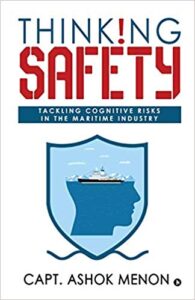 Although shipping seems to be investing heavily in training, maritime accidents continue to occur. A new book comes to provide a different perspective of the industry’s current approach on safety, arguing that a thorough understanding of human cognitive behavior could eliminate human error-related accidents. Written by Capt. Ashok Menon, a Senior Marine professional, the book cites information regarding human brain and its functions, as well as factors varying from anxiety to fatigue, to end up proposing some new training schemes for a cognitive risk awareness. The book highlights that more training is not the solution, as human element is a very complicated issue related to the complexity of human thinking.
Although shipping seems to be investing heavily in training, maritime accidents continue to occur. A new book comes to provide a different perspective of the industry’s current approach on safety, arguing that a thorough understanding of human cognitive behavior could eliminate human error-related accidents. Written by Capt. Ashok Menon, a Senior Marine professional, the book cites information regarding human brain and its functions, as well as factors varying from anxiety to fatigue, to end up proposing some new training schemes for a cognitive risk awareness. The book highlights that more training is not the solution, as human element is a very complicated issue related to the complexity of human thinking.

































































